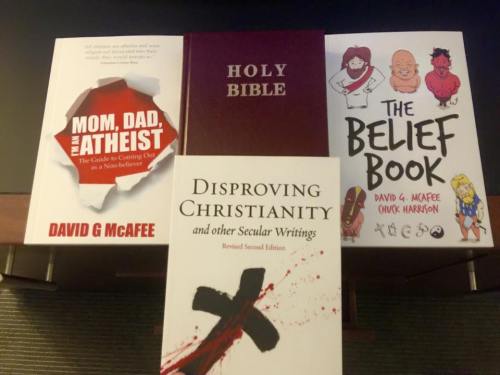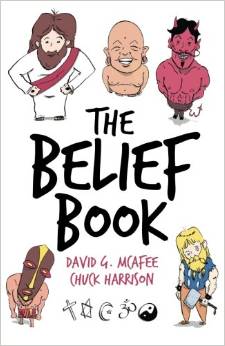Atheists Should Stop Trying to Destroy Religion
By David G. McAfee, author of The Belief Book
I’m an atheist who studies religion. You might think that seems contradictory, but to me it makes all the sense in the world. I’ve never been religious, but I have always enjoyed learning about how religions start and spread, how they interact with and influence one another over time, and the psychology behind the ideas themselves. I’m incredibly interested in beliefs and myths and understand that there are good and bad aspects of faith, so imagine my surprise when people assume I want to “destroy,” “obliterate,” or “abolish” religion altogether just because I’m not a believer.
I partly understand the assumption because I know a lot of non-believers who want to do exactly that. I’ve heard people, who often call themselves “anti-theists” and who others might call “Fundamentalist Atheists” or “New Atheists,” refer to religion as a “cancer” that they want to surgically remove from humanity. But calling religion a cancer implies that it is always bad in all circumstances – that it isn’t beneficial to anyone and is dangerous in all its forms. Can we really say that’s the case for religion?
Rape or religion?
I consider myself a fan of a number of works written by Sam Harris, a neuroscientist and author often referred to as one of the “Four Horsemen of the Non-Apocalypse,” but he said something I think was off in a 2006 interview with The Sun Magazine. He is quoted as saying, “If I could wave a magic wand and get rid of either rape or religion, I would not hesitate to get rid of religion.” He went on to explain that “more people are dying as a result of our religious myths than any other ideology.”
While I agree with Harris that religious extremism is dangerous, I don’t think religion itself is inherently evil and I certainly wouldn’t say it’s worse than rape. Religion isn’t a crime or a violation – it’s a tool. It’s been used to justify violence and bigotry, yes, but (due to the contradictory nature of holy texts) it’s also used at times as a means to promote well-being and reinforce positive ethics.
To answer the rape or religion question simply, think about all of the instances in which you think rape is completely acceptable and then compare that to the number of times when religious people are harmless. Think of your friends or relatives who quietly practice a religion without affecting others because it makes them feel good or because it provides a sense of community. Rape always causes harm – there are times when religions do not.
Wiping out religion.
While Harris’ scenario was hypothetical, magical, and – he admitted – inflammatory, there are many people who actively seek to destroy faith-based belief systems entirely. Some anti-theists hope to outlaw faith by enacting some sort of (unenforceable) thoughtcrime legislation, others think ridicule alone will completely eradicate supernatural beliefs, and a small number of these anti-theists want to end religion so badly that they see violence as the answer.
Recently, I was approached by a self-described anti-theist who suggested that killing every single religious person – man, woman, and child – was a viable “cure for religion.” This would be almost negligible if it were just a one-off occurrence, or if the person was saying it for shock value, but I’ve heard this proposal a number of times and this particular individual stressed his military background and demanded a logical rebuttal to his position. I told him that killing all religious people to end religion isn’t just a disturbing thought, it also wouldn’t work.
The urge to believe.
As someone who studies comparative religion, the idea of obliterating faith-based practices through genocide is especially confusing. It is well established that religion itself is a cultural universal and that it likely has or had evolutionary benefits, so why wouldn’t new religions arise after the mass deaths? History and anthropology tell us that new systems would arise, and they would look a lot like the old ones with different names and stories.
You can’t remove religions by force, either by banning them or by killing those who believe, because the feelings and circumstances that caused us to create them have remained largely unchanged for hundreds of thousands of years. The urge to believe still exists inside the minds of people, as does our desire to know “the unknown.” The fact is that we will probably never completely outgrow religion. We are prone to superstition, organization, and wishful thinking — and religions are often forged when those tendencies are realized.
Pascal Boyer, Henry Luce Professor of Individual and Collective Memory at Washington University in St. Louis, Missouri, says his research suggests that “atheism will always be a harder sell than religion because a slew of cognitive traits predispose us to faith.”
Is Religion on the Ropes?
The Pew Research Center recently released a report indicating that “the Christian share of the U.S. population is declining, while the number of U.S. adults who do not identify with any organized religion is growing.” This is good news because it shows that people are less likely to identify with a restricting dogma, but it doesn’t mean religion is coming to an end any time soon. In fact, more than 70 percent of American citizens still identify as Christians while the “unaffiliated” make up only 22 percent and atheists only three percent.
That isn’t to say religion will always be as strong as it is today, however. Tufts University Professor Daniel C. Dennett, another one of the so-called “Four Horsemen,” recently argued that “the future of religion is bleak.” I agree with the thrust of his article – that there is a rising tide of secularism in the age of information – but even he clarifies that this won’t mean an end to religion.
“If this trend continues, religion largely will evaporate, at least in the West,” Dennett wrote. “Pockets of intense religious activity may continue, made up of people who will be more sharply differentiated from most of society in attitudes and customs, a likely source of growing tension and conflict.”
What can we do?
So, if you can’t enact a successful prohibition on religious ideas, and it won’t work to kill all believers, how do we fix the issues that stem from or are justified by religion? We work to reform religion – to fight against the aspects of it that are harmful and allow people to practice those that aren’t – and promote secular religious education to help people better understand religions and how they arise.
I, for one, don’t hate religion. It’s not that black and white for me – I don’t have to either endorse all actions done in the name of religion or condemn its practice entirely. I hate religious extremism, but I don’t hate meditation or meditative prayer; I hate that religious ideals have consistently impeded science and invaded secular governments, but I don’t hate food drives and soup kitchens; I hate the “God is on our side” mentality and that millions of people think that religion is necessary to live a happy and moral life, but I don’t hate peaceful religious practices or people who happen to believe differently.
Are all religious people extremists? Are they all against science and in favor of knocking down the wall of separation between Church and State? Do they all hate people who believe differently because they’re evil? The answer, in each case, is “No.”
Fundamentalism as a common enemy.
Religion is not something you can simply erase; it’s an integral part of our history and (for better or worse) it will help shape our future. Religion was man’s first attempt to explain the unknown and it continues to be an inspiration for major (charitable and horrific) acts around the world every day, so it will likely exist for the foreseeable future. But does it have to exist in a stagnant state as it has for thousands of years? Many people, whether they identify with a tradition or not, think we can change religion for the better.
When reformation (and not extermination) is the goal, we atheist activists can find common ground with many believers. I know many Christians, Muslims, Hindus, and Buddhists who would agree that fundamentalism within their respective religions is a problem that needs to be stopped – just as most atheists I know would never advocate violence against believers.
There are other areas of agreement between the rational but largely silent non-religious and religious majorities. I think most religious people and most non-believers, for instance, oppose things like Young Earth Creationism being taught in science class and are in favor of things like same-sex equality. If we work with open-minded religious people, we may be able to reduce religious extremism without eliminating anyone’s freedom to believe or worship and without killing anyone. I think it’s worth a shot.
Ultimately, you have to decide: do you think belief in god(s) is our biggest problem right now? Or organized religion? Or, like me, do you see scientific illiteracy and civil rights as the key issues?

Can we debate religion in a friendly manner?
David G. McAfee is a Religious Studies graduate, journalist, and author of The Belief Book, a children’s book explaining the origins of beliefs and religion, and Mom, Dad, I’m an Atheist: The Guide to Coming Out as a Non-believer. He is also an editor for Ockham Publishing and a contributor to American Atheist Magazine. McAfee attended University of California, Santa Barbara, and graduated with bachelor’s degrees in English and Religious Studies with an emphasis on Christianity and Mediterranean religions.







